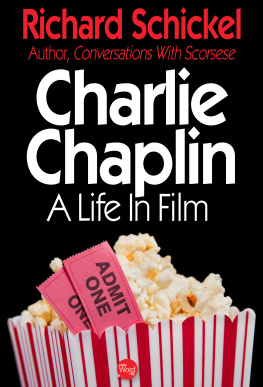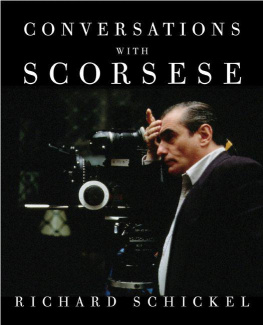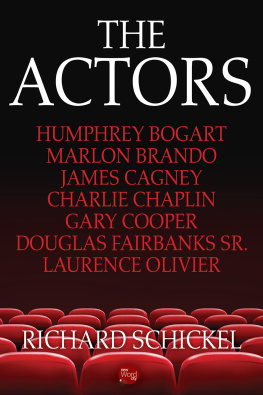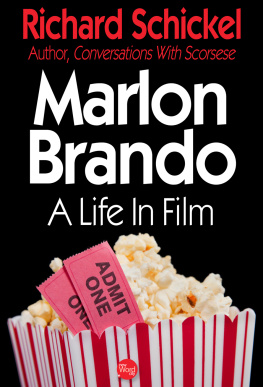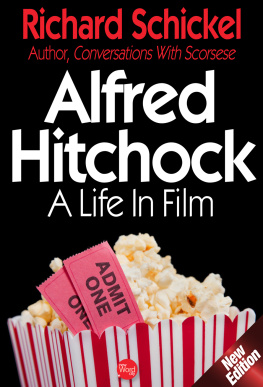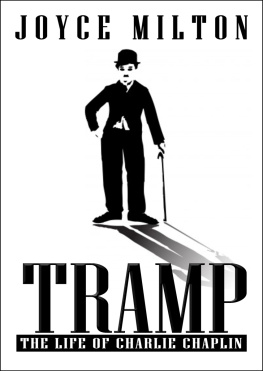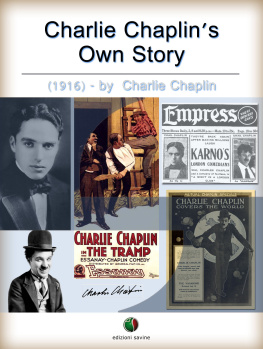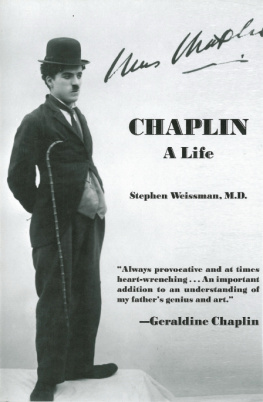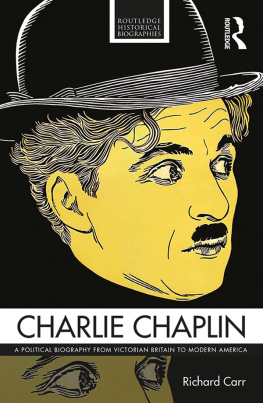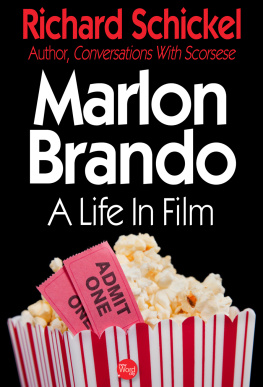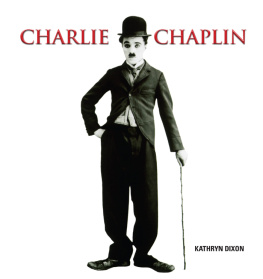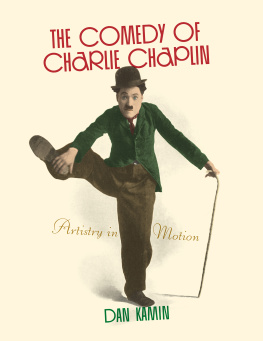Richard Schickel - Charlie Chaplin. A Life In Film
Here you can read online Richard Schickel - Charlie Chaplin. A Life In Film full text of the book (entire story) in english for free. Download pdf and epub, get meaning, cover and reviews about this ebook. year: 2011, publisher: New Word City, genre: Non-fiction. Description of the work, (preface) as well as reviews are available. Best literature library LitArk.com created for fans of good reading and offers a wide selection of genres:
Romance novel
Science fiction
Adventure
Detective
Science
History
Home and family
Prose
Art
Politics
Computer
Non-fiction
Religion
Business
Children
Humor
Choose a favorite category and find really read worthwhile books. Enjoy immersion in the world of imagination, feel the emotions of the characters or learn something new for yourself, make an fascinating discovery.
- Book:Charlie Chaplin. A Life In Film
- Author:
- Publisher:New Word City
- Genre:
- Year:2011
- Rating:3 / 5
- Favourites:Add to favourites
- Your mark:
- 60
- 1
- 2
- 3
- 4
- 5
Charlie Chaplin. A Life In Film: summary, description and annotation
We offer to read an annotation, description, summary or preface (depends on what the author of the book "Charlie Chaplin. A Life In Film" wrote himself). If you haven't found the necessary information about the book — write in the comments, we will try to find it.
Charlie Chaplin - beloved by his generation, nearly forgotten today - was a cinematic visionary in endless conflict with his times. It turns out, legendary film critic Richard Schickel argues, that his life was far more fascinating than any of the Little Tramps adventures. Heres his story.
Charlie Chaplin. A Life In Film — read online for free the complete book (whole text) full work
Below is the text of the book, divided by pages. System saving the place of the last page read, allows you to conveniently read the book "Charlie Chaplin. A Life In Film" online for free, without having to search again every time where you left off. Put a bookmark, and you can go to the page where you finished reading at any time.
Font size:
Interval:
Bookmark:
Praise, at a certain point, became superfluous. Charlie Chaplin received it, in fullest measure from his peers (the greatest artist that was ever on the screen - Stan Laurel; the greatest comedian who ever lived - Buster Keaton; the greatest artist that ever lived - Mack Sennett; the best ballet dancer that ever lived, and if I get a chance Ill kill him with my bare hands - W.C. Fields); from the critics (It seems unlikely that any dancer or actor can ever have excelled him in eloquence, variety and poignancy of motion - James Agee; one of the few great comic geniuses who have appeared so far in history - Robert Warshow; Chaplins career is a cinematic biography on the highest level of artistic expression - Andrew Sarris); and from the upper echelons of the literary world (the only genius developed in motion pictures - George Bernard Shaw; among his ages first artists - Edmund Wilson).
One could fill an essay with such quotations and still have plenty left over. Moreover, one would in the end have a sentence or two from almost every critic and every artist one admires. Or so it sometimes seems. It is a measure not merely of the impact of Chaplins art but of the force of his astonishing ego that one simply cannot find an article written while he was alive that presumes to criticize him, or even to view his life and work with decent objectivity, which does not begin with some sort of apology and end in humility, with the writer bowing his way backward out of the throne room, murmuring assurances of his fealty to the great man and his works.
It was understandable, even to those of us born after, say, 1930, whose feelings for the Little Fellow (Chaplins own term of choice for his great Tramp creation) were rather abstract. We may not have experienced the excitement of discovery, that sense of possessing (and being possessed by) the Little Fellow that earlier generations felt. But we knew who he was, of course, and our elders endlessly guaranteed his greatness to us, so if we found it impossible to love him as he was loved by those who had been present at the creation, we felt honor-bound to appreciate him. This was especially so in the 1940s and 1950s, when it was vitally important not to seem to be making common cause with Chaplins enemies, those right-wing crazies hounding him about his admittedly Stalinist, but really quite innocently motivated, politics and about a personal morality that, with the passing decades, begins to seem equally unworthy of extensive, let alone outraged, comment. (People magazine today would spare no more than an indifferent page or two for the adventures that once created scandalized headlines the world over.) One made allowances for him, for the blowhard conclusions of The Great Dictator and Monsieur Verdoux, the self-sentimentalizing egotism of Limelight, the arid longueurs of A Countess from Hong Kong - and was secretly relieved that he withheld AKing in New York from the American market, so (correctly, as it turned out) dismal were the reports of it. One said: Well, he is old. One said: Well, he is understandably bitter at the way people turned on him. One also thought: He is isolated from the world in his Swiss exile and, perhaps, isolated from his best self by his wealth and by the belated but obvious happiness he found in his last marriage and in the vast family he and Oona ONeill created. Anyway, time enough - an eternity - to test his claims on eternity after he was gone and the burden of his self-regard, at once so oppressive and so delicate, was lifted from us.
This last assumption, however, contained an unspoken assumption, which was that the world after he left it would remain pretty much as it had been when he departed. But it has not. Consider quite a minor matter, the decline of serious film criticism. There was never much of it to begin with; but it now lacks even the few public forums it could once command, and even the best of them is - shall we say, putting it mildly? - uninterested in historical issues like the Chaplin question. Indeed, film history (as opposed to movie nostalgia) now ends about two months ago. Movie reviewing has become a form of performance art when it is not merely a minor adjunct of the publicity machinery. And the young film scholars, though they may well be film school-trained, have not been brought up to care very deeply about the formative masters of their medium. At best they seem to be able to muster only a sort of distant patronization for the likes of Griffith, Eisenstein, and everyone else who had the misfortune to labor in daunting, distancing silence. Cant blame them, really. The witnesses to these great lives have disappeared; the issues raised by their art grow more distant; the stylizations within which they operated grow more and more remote. For better or worse, the world has moved on. Like the rest of his contemporaries, Chaplin has become the wrong sort of Mr. October - someone to be hurried appreciatively but dispassionately past in Survey of World Cinemas first boring weeks, someone whose importance is now, alas, merely historical.
Where once the reality of the man was shrouded in heedless praise, now it is wrapped in undiscerning indifference. Perhaps he would not care. Alive, he seemed to seek, above all, the status of unexamined premise, so perhaps passing into posterity that way would have pleased him: a great man, known by name to everyone, known as a troublesome, problematic reality only to an ever-dwindling, ever-aging band of specialists.
Somehow, though, one does not see him content with this role. Nor should we be. For there was always more here than met the eye at first, more here than a universal figure, the Little Fellow, who seemed to encompass in his brilliant pantomime routines the common lot of the common man. That was, for Chaplin, just the beginning, and he lived to see that if he had stopped there, his career would have had no more historical resonance than those of his major rivals, Harold Lloyd and Buster Keaton. He might have been rich but unhappy like the former, lonesomely rattling around in a great empty mansion, or poor but unhappy like the latter, sadly rattling around in nightclubs and TV commercials.
It was almost as if Chaplin could discern the possibility of such a fate and, from the beginning, worked to avoid it by involving himself and his audience in a far larger drama - a drama, as it turned out, in one of the classic twentieth-century molds, that of the artist-visionary in endless conflict with his age. It was, and is, infinitely more fascinating than any of the Little Fellows adventures - with its author engaged, right to the end, in creating for us an aesthetically satisfying climax for it. This was the urtext for all the great celebrity dramas that have followed, and as such it has a significance that far transcends any of the individual works that were finally best understood merely as incidents in this larger creation.
The drama was divided, as all epic works used to be, into five crowded acts, which might be subtitled Self-discovery, Success, Struggle, Tragedy, and - when the audience at the 1972 Academy Awards ceremony rose in cheering, tearing ovation to welcome him back to the industry and the community he as much as any single individual created, and everybody forgave everybody - the last act, Triumph. If there was high novelty in this scenario, it consisted largely of his reversing the usual order of Acts Two and Three, placing Struggle after Success. But in that, too, he was prescient, for as time has worn on, that is the way things have tended to be ordered in other great celebrity tales.
Like his greatest routines, the Chaplin drama has a simplicity, an inevitability (and a self-consciousness) that are awesome. Of course, fate helped him out a little bit, especially with his opening scenes, for he was born into poverty, the son of a drunken father and a mother who went mad. A Dickensian childhood ensued, but one which turned out to have its uses as the source of his art, which he began to perfect at an early age, becoming, at age twenty-one, the leading man in one of the Fred Karno comedy troupes, where he learned the classic English music hall style. As everyone knows, it was at that age that Chaplin came to the United States with a Karno company. It was while working with it that he was discovered by Mack Sennett, for whom he began working in 1914.
Font size:
Interval:
Bookmark:
Similar books «Charlie Chaplin. A Life In Film»
Look at similar books to Charlie Chaplin. A Life In Film. We have selected literature similar in name and meaning in the hope of providing readers with more options to find new, interesting, not yet read works.
Discussion, reviews of the book Charlie Chaplin. A Life In Film and just readers' own opinions. Leave your comments, write what you think about the work, its meaning or the main characters. Specify what exactly you liked and what you didn't like, and why you think so.

